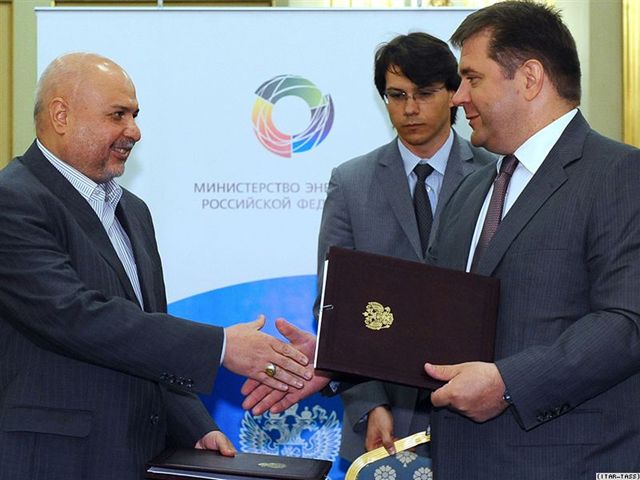
Loopholes Opening in US, EU Sanctions on Iran
By:

The United States and the European Union have imposed on July 1 and July 26, respectively, a new round of sanctions of unprecedented severity, presuming to hinder Iran’s uranium-enrichment program. Other parties, however, are wasting no time opening loopholes in these sanctions’ main dimension, pertaining to Iran’s oil and gas sector.
Imposed outside the UN Security Council’s framework, these sanctions entail a triple bar: against sales of gasoline and other refined oil products to Iran (the country is 40 percent import-dependent in this regard), against investments in Iran’s energy sector, and against sales of equipment for exploration, production, and processing of oil and gas (Frankfurter Allgemeine Zeitung, Le Monde, July 27). The bar on selling equipment for Iranian gas liquefaction must especially please Gazprom in this overall gift package.
Russia’s energy ministry has already announced that Russian oil companies may step in to supply gasoline and other refined petroleum products to Iran, subject only to profitability; while the state-controlled Gazprom Neft has entered the Anaran oilfield project in Iran, alongside the National Iranian Oil Company (NIOC). Russian Energy Minister, Sergei Shmatko, announced these intentions while signing a road-map agreement with Iranian Oil Minister, Masoud Mirkazemi, in Moscow, barely two weeks after the US had enacted the sanctions, and the EU had announced their imminent enactment (EDM, July 20).
On July 28, the Russian foreign ministry issued a statement criticizing the EU sanctions against Iran as “unacceptable.” According to the ministry, Russia only recognizes sanctions approved by the UN Security Council [by Russia itself]. The Russian government had reacted in the same way to the US sanctions imposed on July 1 on Iran; and Shmatko cited that position in announcing Russia’s intentions to do business with Iran in the oil and gas sector.
Whether the Russian government and companies under its control would proceed to breach these sanctions, as just hinted, is far from a foregone conclusion. For now, Moscow is signaling that it does not recognize those sanctions, reserving the right to ignore or circumvent them. Moscow would decide whether or when to comply with this set of sanctions, as well the concessions it wants in return from Washington (the main interested party in these sanctions).
On July 23, the Turkish private company, Som Petrol, signed with NIOC an agreement to build a gas pipeline from Iran to Turkey, with a capacity of some 15 billion cubic meters per year, partly for supplying Turkey and partly for export to European markets. NIOC would pay fees for the transit of gas volumes to Europe via Turkish territory, according to Som Petrol CEO Sitki Ayan. The investment is estimated at $1.3 billion and the duration of construction at three years, with a target date for completion in 2014.
The signing of this agreement in Tehran coincided with Mirkazemi’s visit to Ankara, on the heels of his Moscow visit. Receiving Mirkazemi, Turkish Energy Minister, Taner Yildiz, pointed out that the state-owned Turkish Petroleum (TPAO) and Botas companies are not involved in this project (IRNA, July 23; Hurryiet Daily News and Economic Review, July 24; Upstream Online, Gulf News, July 26; EDM, July 27).
TPAO had withdrawn from Iran’s South Pars gas extraction project last year, under the pressure of an earlier round of US sanctions. Som Petrol and NIOC would each build the section of the pipeline on the respective national territories. This delimitation would not expose Som Petrol to the sanctions against investments in Iran. Thus, such a division of labor could be emulated by others to open additional loopholes in the sanctions.
In Iraq, the Kurdistan regional government in Erbil and the central government in Baghdad are both supplying Iran with crude oil and refined products. The two seats of authority disagree with each other about the division of legal competencies and profits in connection with these sales to Iran. The Baghdad government claims that Erbil’s sales constitute smuggling, unless authorized by the central government. Iraq’s Oil Minister, Hussein al-Shahristani, threatens that the government would reduce subsidies to the Kurdish region by an amount equal to that region’s profits from the oil and fuel sales to Iran. In Erbil, however, the Kurdish Natural Resources Minister, Ashti Hawrami, counters that such sales to Iran are within the regional government’s rights and had been authorized from Baghdad (Journal of Turkish Weekly, July 26).
Apparently, both Baghdad and Erbil are undeterred by the international sanctions. Their dispute is of an internal nature. And given Iran’s political influence within Iraq, it seems far from certain whether the US could prevail on Iraqi authorities to recognize the sanctions officially and then to prevent smuggling of Iraqi oil products to Iran.




